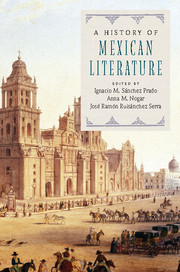Book contents
- Frontmatter
- Contents
- List of contributors
- Introduction
- PART I COLONIAL LITERATURE
- PART II THE NINETEENTH CENTURY
- 9 Early Nineteenth-Century Nation-Building Prose
- 10 The Emergence of the Mexican Literary Field (1833–1869)
- 11 The Rise of Cultural Institutions
- 12 Liberal Literat
- 13 The Conservative Paradigm
- 14 Mexican Modernismo
- PART III TWENTIETH AND TWENTY-FIRST CENTURIES
- PART IV MEXICAN LITERATURE BEYOND BOUNDARIES
- Index
- References
13 - The Conservative Paradigm
from PART II - THE NINETEENTH CENTURY
Published online by Cambridge University Press: 05 July 2016
- Frontmatter
- Contents
- List of contributors
- Introduction
- PART I COLONIAL LITERATURE
- PART II THE NINETEENTH CENTURY
- 9 Early Nineteenth-Century Nation-Building Prose
- 10 The Emergence of the Mexican Literary Field (1833–1869)
- 11 The Rise of Cultural Institutions
- 12 Liberal Literat
- 13 The Conservative Paradigm
- 14 Mexican Modernismo
- PART III TWENTIETH AND TWENTY-FIRST CENTURIES
- PART IV MEXICAN LITERATURE BEYOND BOUNDARIES
- Index
- References
Summary
In a recent essay, Giorgio Agamben writes: “a paradigm entails a movement that goes from singularity to singularity and, without ever leaving singularity, transforms every singular case into an exemplar of a general rule that can never be stated a priori” (2009: 22). This formulation allows us to rethink the literary practices of conservatism in nineteenth-century Mexico in a way that, firstly, preserves their plurality – even, and better still, privileges them – and, secondly, considers texts without subordinating them to the varying political affiliations of their authors.
One of the shared traits present in this collection of singular texts can be culled by examining the term conservador itself. In nineteenth-century usage, it referred to the director of a museum, the person in charge of preserving the treasures of the past. Thus understood, the conservative paradigm offers a curated version of literary production involving a variety of strategies that involve not only preservation, but also the excision, effacement, and subordination of that which is not deemed valuable or precious. In this dual operation, the popular is superseded and appears, if at all, as residual barbarism.
Although I will privilege the period that goes from 1832 (the year Conde de la Cortina returns to Mexico) to 1867 (the restoration of the republic), the first case of this conservative paradigm predates the War of Independence. The crucial name here is, of course, José Joaquín Fernández de Lizardi, who often wrote the voice of the léperos and more often still wrote for the popular classes of society. Fernández de Lizardi is allotted considerable attention in the first anthology of Mexican poetry allegedly compiled by José María Luis Mora in 1836. However, in the years that would follow, Lizardi´s agile verse was effaced from the panorama of Mexican poetry.
This effacement allows me to examine the crucial Count José Justo Gómez de la Cortina (1799–1860). His works include his long review of the first Año nuevo, published in 1837; his edition of a still-useful Diccionario de sinónimos castellanos (1845); his enjoyable if overzealous Diccionario de barbarismos y solecismos (1852); his successful effort to found a Mexican Academia de la Lengua, modeled after the one in Madrid; and, most importantly, his literary criticism published in the Zurriago.
- Type
- Chapter
- Information
- A History of Mexican Literature , pp. 203 - 217Publisher: Cambridge University PressPrint publication year: 2016
References
- 1
- Cited by

